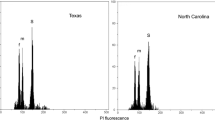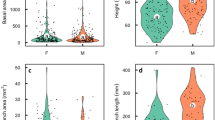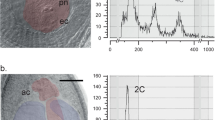Abstract
THE phenomenon of heterothallism (the separation of sex in different individuals) is known to occur in the Phycomycetes (Mucor), in the Ascomycetes (Ascobolus, Penicillium), in a large number of Hymeno-mycetes (mushrooms and toadstools), and in the Smut fungi. Therefore the question arises: Does heterothallism occur in tho Rust fungi? An attempt to solve this problem, which is of considerable theoretical and perhaps practical interest, has been made by the author by sowing the sporidia of Puccinia helianthi on leaves of young Sunflower plants and observing whether or not aecia are produced: (1) when a single sporidium is sown by itself, and (2) when two sporidia are sown close together.
This is a preview of subscription content, access via your institution
Access options
Subscribe to this journal
Receive 51 print issues and online access
$199.00 per year
only $3.90 per issue
Buy this article
- Purchase on Springer Link
- Instant access to full article PDF
Prices may be subject to local taxes which are calculated during checkout
Similar content being viewed by others
Author information
Authors and Affiliations
Rights and permissions
About this article
Cite this article
CRAIGIE, J. Experiments on Sex in Rust Fungi. Nature 120, 116–117 (1927). https://doi.org/10.1038/120116a0
Issue Date:
DOI: https://doi.org/10.1038/120116a0
This article is cited by
-
Life cycle and nuclear behavior in three rust fungi (Uredinales)
Mycoscience (2002)
-
The diversity of nuclear cycle in microcyclic rust fungi (Uredinales) and its ecological and evolutionary implications
Mycoscience (2002)
-
Mating type of isolates derived from the spermogonial state of Puccinia coronata var. coronata
Mycoscience (1994)
-
Development of pycnium in the genus Ravenelia
Mycopathologia (1975)
-
Specialization, hybridization, and mutation in the cereal rusts
The Botanical Review (1946)
Comments
By submitting a comment you agree to abide by our Terms and Community Guidelines. If you find something abusive or that does not comply with our terms or guidelines please flag it as inappropriate.



